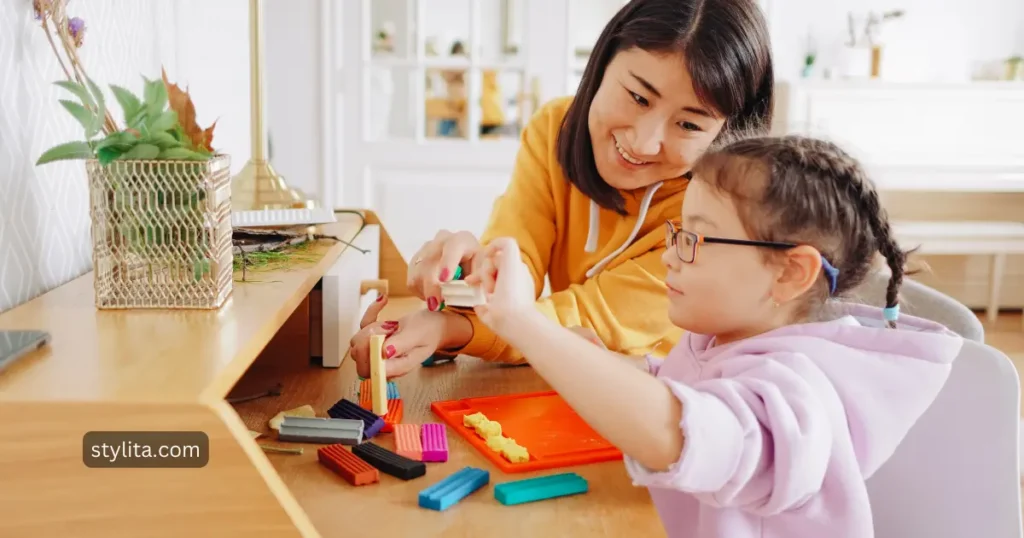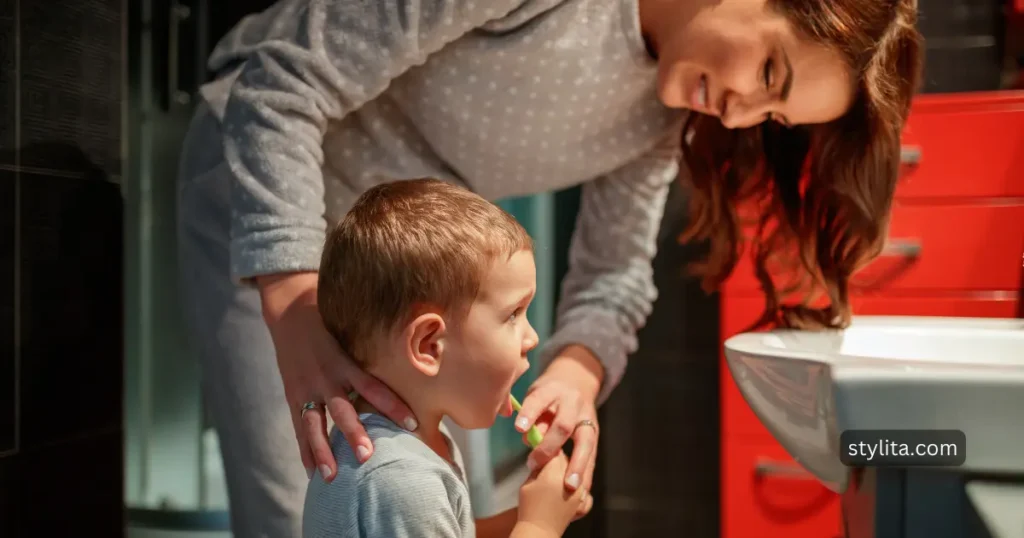A mother who embodies the delicate dance of love, patience, and unflinching commitment is told in the gentle rhythm of daily life. Twenty characteristics stand out as guiding principles as we navigate the terrain of motherhood; each is essential to the overall harmony of a mother’s journey. Join us as we explore the many and profound aspects that contribute to the remarkable and always changing experience that is parenting.
Jump To Section
Unconditional Love

Definition and Role in Motherhood
The essence of motherhood is unconditional love, which has no bounds or restrictions. It is the power that enables moms to accept their flaws and foster an atmosphere unrestricted by acceptance and love. In addition to nurturing the child, this love has the ability to transform and become a beacon of hope in a world that may be both tough and beautiful.
Examples and Expressions
Expressions of this love permeate daily existence; moments of compassion in a glance shared, a comforting touch during trying times, and laughter that reverberates through the walls, transforming into a melody of love. Unconditional love is a language that is spoken through many deeds of kindness, support, and the constant conviction that every kid has boundless potential. It is not just an emotion.
Patience

Dealing with Challenges
Patience is the quiet presence that helps parents navigate through difficult situations and tantrums. It is the compass in the storm of parenting. It’s the steadfast spirit that transforms frustrating moments into learning experiences. When faced with obstacles, patience transforms into a powerful teacher who teaches mother and child the value of tenacity, the art of resilience, and the grace that comes from overcoming hardships.
Teaching Moments
Mothers can be silent educators who teach empathy and resiliency when they are patient. Children acquire the ability to gracefully navigate life’s challenges by means of these instructive instances. Mothers teach their children the priceless talent of emotion regulation, critical thinking, and an open heart to the process of self-discovery by setting an example of patience.
Empathy

Understanding Child’s Perspective
Mothers can see the world through their children’s eyes because empathy is the link that connects their hearts and minds. It serves as the cornerstone for deep relationships, fostering mutual understanding, and trust. A tie that transcends language is formed between mothers and their children as they develop empathy. This bond is based on a shared human experience and a profound comprehension of the nuances of each child’s individual journey.
Emotional Support
Mothers offer steadfast emotional support through happiness and sadness, fostering a safe space where feelings are accepted, vulnerabilities are welcomed, and the groundwork for emotional intelligence is established. A child’s growth is anchored by emotional support, which teaches them how to manage their emotions, communicate honestly, and develop resilience in the face of life’s inevitable setbacks.
Nurturing Nature

Creating a Supportive Environment
A loving mother creates a space where support and affection serve as building blocks for development. It’s a safe haven where kids may grow and acquire the fortitude they need to deal with life’s obstacles. The roots of self-assurance, curiosity, and creativity grow in this nurturing atmosphere, molding kids into people who face the world with bravery and a clear sense of purpose.
Balancing Independence and Guidance
By skillfully balancing the provision of advice with independence, moms enable their children to discover, experiment, and cultivate their individual abilities. Children travel this path with a growing sense of self-assurance and the knowledge that they have a solid mentor. A mother’s ability to strike a balance between independence and supervision is evidence of her dedication to helping her children develop critical thinking skills, self-reliance, and a strong sense of self.
Effective Communication

Listening Skills
The foundation of effective communication is the skill of listening, which mothers develop to actually hear the words, feelings, and nonverbal clues of their children. The basis for developing mutual respect, trust, and understanding is what makes the parent-child bond stronger. Mothers who actively listen to their children establish an environment where children feel supported, heard, and valued, which is essential for promoting healthy communication and relationships.
Open Dialogues
Mothers foster an environment of free communication and honesty. These conversations serve as a means of bridging generations and creating an atmosphere in which kids feel free to freely share their ideas, emotions, and worries. Open communication is a means to understanding, empathy, and a mutually beneficial journey of development. It is not merely a means of exchanging information. Mothers and kids have meaningful interactions in these open forums that create the foundation for enduring relationships and respect for one another.
Consistency

Establishing Routine
The constant amid the ups and downs of family life is consistency. Children feel safe and nourished in a predictable environment that is created by daily rituals and routines, which offer a sense of security. Establishing routines is a conscious decision to create a structure that promotes order, accountability, and a sense of belonging in the family, rather than just being a convenience.
Reliability in Parenting
The foundation of a child’s emotional health is the dependability of a mother’s love and instruction. It’s the knowledge that a mother is always there to comfort and stabilize you, even in the face of life’s uncertainty. In parenting, reliability is more than simply being physically there; it’s a dedication to being emotionally available, a solid rock that kids can rely on to help them through the challenges of growing up.
Adaptability

Handling Change
The key to good parenting is adaptability, which is the capacity to accept change with fortitude and grace. Mothers help children learn the value of overcoming obstacles with a positive attitude by navigating the ups and downs of life. Managing change turns into a skill—a dance between stability and adaptability—that helps kids learn how to face life’s challenges with fortitude, hope, and an open mind.
Flexibility in Parenting Styles
Mothers modify their methods of parenting to fit the particular requirements of each kid, from the gentle guidance of infancy to the empowering mentorship of adolescence. Because of its adaptability, the connection is dynamic and conducive to growth and transformation. Parenting with flexibility means realizing that every child is an individual with different needs, abilities, and goals. It’s a dedication to modifying parenting styles to support each child’s potential for growth.
Positive Role Modeling

Setting Examples
Mothers are the main role models; they establish expectations for attitudes, beliefs, and behavior. Their deeds become a living curriculum, imparting to kids the real meaning of resilience, compassion, and integrity. Authenticity, or the sincere presentation of values and concepts that youngsters take in and carry into adulthood, is more important when setting an example than perfection.
Instilling Values
Mothers teach priceless lessons about kindness, empathy, and social responsibility via their daily encounters. Children acquire the moral compass necessary to handle the challenges of life with integrity and grace through the positive modeling that occurs in their environment. Value instillation is a continual process that involves constant dialogue that forms the moral foundation for children’s decision-making, interpersonal development, and good world impact.
Encouragement

Fostering Confidence
Support serves as a catalyst for personal development and self-discovery. Mothers encourage their children to follow their passions by giving them small pushes along the way, helping them develop resilience and self-assurance in the face of difficulty. Building confidence requires a careful balance between praising efforts, appreciating little triumphs, and offering the assistance required to face obstacles. It’s a path to strengthen a child’s self-belief and fortitude to face life’s curveballs head-on and maintain a resilient spirit.
Celebrating Achievements
Mothers validate their children’s efforts and confirm their worth by applauding their accomplishments. These festivities turn into important occasions where kids get the courage to face challenges head-on and follow their aspirations with unyielding resolve. Honoring successes involves more than simply the final product; it also involves appreciating the process, the development, and the resiliency that come with each stage. It’s a celebration of the special characteristics that make every child exceptional—a shared joy that strengthens the link between mother and child.
Discipline with Love

Setting Boundaries
Clear communication, empathy, and respect are the foundations of loving discipline. Setting limits gives kids discipline and direction while also encouraging a feeling of accountability and responsibility. Establishing limits requires a careful balance, clarity, consistency, and an appreciation that discipline is a teaching tool rather than a punitive one. By using this strategy, mothers foster an atmosphere where kids can negotiate regulations, make wise choices, and strengthen their moral compass.
Teaching Responsibility
Mothers instill in their children the value of responsibility and restraint through discipline. Children learn the importance of making informed decisions and the consequences of their actions during these teaching moments. Instilling a sense of ownership—the understanding that decisions must be carefully considered and that actions have consequences—is a crucial step in teaching responsibility. It’s a process that helps kids grow up to be morally upright adults who make valuable contributions to their communities.
Time Management

Balancing Work and Family
Mothers must learn the art of juggling conflicting priorities. It’s the intentional scheduling of time, making sure that, in the midst of the responsibilities of job, education, and extracurriculars, times of presence and connection are given priority. Work and family balance requires constant negotiation and an understanding that time is a valuable resource that should be used wisely. It’s a dedication to establishing a balanced schedule that accommodates work and family obligations while fostering deep relationships and common experiences.
Quality Time vs. Quantity Time
Mothers value quality over quantity in the hectic tornado of everyday living. They make timeless memories, fortify their relationships, and impart the unwavering love that is the very essence of motherhood by savoring every second they spend with their kids. The debate between quantity and quality time comes down to prioritization, or the deliberate decision to give your all at the times that really count. It’s a dedication to weaving a web of affection, humor, and shared experiences into the fabric of family life.
Self-Care

Importance of Mother’s Well-being
Self-care is not a luxury; it’s a lifeline. Mothers understand how important it is to put their mental, emotional, and physical wellness first. Mothers go on a journey of self-preservation to make sure they are prepared to give their family the finest care possible. Beyond a woman’s personal health, a mother’s well-being is important since a well-cared-for mother is better able to nurture her family. Making self-care a priority is an investment in resilience, giving moms the vigor and stamina they need to deal with the challenges of parenting.
Strategies for Self-Care
Self-care techniques range from easy daily routines to recurring retreats. It’s the understanding that taking care of oneself is not selfish but rather an essential part of preserving the delicate equilibrium needed to meet the demands of parenting. Self-care techniques are varied and individualized, catering to the particular requirements and inclinations of every mother. These techniques—whether they be found in alone time, exercise, artistic endeavors, or supportive relationships—become the cornerstone for maintaining wellbeing in the face of life’s responsibilities.
Creativity

Encouraging Imagination
For youngsters, creativity is the spark that lights the flame of imagination. Mothers provide a sense of surprise and curiosity that serves as the cornerstone for lifelong learning by nurturing this spark. It takes more than just giving creative tools to foster imagination; it also involves fostering an atmosphere that sparks creativity in ordinary situations. It’s an adventure of seeing the world through the eyes of a child, appreciating the delight of discovery, and fostering the seemingly endless possibilities that creativity brings to light.
Finding Joy in Everyday Moments
Mothers have mastered the skill of finding delight in the little things in life. Motherhood is extraordinary because it teaches you to appreciate the little things in life, find beauty in the everyday, and cherish the moments you have with your children. This search for joy is woven into everyday encounters and routines rather than being dependent on large gestures. It’s a way of thinking that turns everyday experiences into unforgettable ones; it’s a celebration of the happiness that results from the straightforward, real, and tender moments that a mother and child enjoy.
Problem-Solving Skills

Teaching Critical Thinking
Critical thinking instruction helps students develop their problem-solving abilities since it is a vital talent for overcoming obstacles in life. Mothers enable their children to think critically, assess situations, make wise decisions, and approach issues from a solution-focused perspective. Teaching children to think critically is a collaborative process in which mothers help them ask questions, weigh other viewpoints, and build a resilience that turns setbacks into learning opportunities.
Navigating Challenges Together
There will inevitably be obstacles in the fabric of family life. Mothers foster a collaborative environment where problem-solving becomes a joint activity by navigating these problems alongside their children. Overcoming obstacles as a team teaches cooperation, communication, and the power of unity. It’s a voyage of confidence-building, teaching kids that obstacles can be overcome and answers can be found with perseverance, imagination, and community support.
Resilience

Facing Adversity
The hallmark of a mother’s spirit is resilience, which turns into a ray of hope when faced with hardship. Mothers set an example for a mindset that turns setbacks into opportunities for growth by overcoming obstacles with tenacity. The key to overcoming adversity is to adopt a mindset that views obstacles as chances for growth, learning, and ongoing resilience building rather than trying to avoid problems.
Teaching Resilience to Children
The intentional practice of fostering in kids the idea that obstacles are only opportunities for growth is known as resilience teaching. Mothers help children learn that failures are a necessary part of the process by modeling resilience for themselves. It’s a path of teaching coping skills, emotional intelligence, and the steadfast conviction that, despite hardship, one possesses an inner strength that can be used to meet life’s challenges head-on with dignity and resolve.
Teaching Independence

Balancing Support and Autonomy
Teaching independence requires striking a careful balance between offering assistance and letting freedom grow. By finding this balance, mothers enable their kids to get the knowledge and self-assurance necessary to go through life on their own. Finding the right balance between support and autonomy involves knowing when to intervene and when to let go; it’s a journey that recognizes the value of mentoring kids while encouraging independence.
Life Skills for Independence
Teaching independence to youngsters involves teaching them life skills. Mothers help their children become ready for the voyage ahead by teaching them useful skills. Teaching life skills for independence involves more than just assigning daily chores; it also entails developing an attitude of ingenuity, flexibility, and taking the initiative to overcome obstacles. It’s a journey aimed at giving kids a strong foundation in self-sufficiency and resilience so they can enjoy adulthood.
Cultural Sensitivity

Embracing Diversity
By encouraging a respect for diversity, mothers create a crucial quality: cultural sensitivity. Mothers foster an environment where children learn to appreciate and value a variety of viewpoints, traditions, and backgrounds by embracing and celebrating differences. Embracing variety involves expanding perspectives, dismantling boundaries, and cultivating an international outlook that acknowledges the richness inherent in the human fabric.
Teaching Respect for Differences
Integral to cultural sensitivity is the teaching of respect for diversity. Mothers teach their kids that differences aren’t things to be divided by; rather, they’re threads that join the dots of a colorful, linked universe. It’s a voyage of developing empathy, breaking down prejudices, and teaching kids the value of showing compassion, understanding, and openness to others.
Sense of Humor

Lightening the Mood
A sense of humor grows to be a treasured ally on the parenthood path. Mothers foster an environment where children learn to face obstacles with fortitude and an optimistic attitude by bringing laughter and joy into the room. The ability to lighten the mood is an art; it turns difficult situations into chances for connection, shared delight, and a reminder that laughter is a global language that cuts over the difficulties of everyday life.
Creating Joyful Memories
Moms intentionally weave the creation of happy memories into the fabric of family life. Treasured memories are the result of an intentional effort to inject humor, playfulness, and shared experiences into occasions. These recollections act as anchors, bringing mother and child back to the comforting warmth of love and the eternal happiness that may be found in the small, meaningful moments that truly capture the spirit of family.
Lifelong Learner

Embracing Personal Growth
A mother’s path is one of constant evolution—an investigation of one’s own development, self-discovery, and dedication to lifelong learning. Mothers serve as excellent role models for curiosity, adaptation, and the quest of knowledge because they value personal development. Accepting personal growth is a journey rather than a goal; it is a dedication to introspection, discovery, and the realization that every day brings fresh insights into the mosaic of motherhood.
Sharing the Joy of Learning
Mothers give their children a gift when they share the joy of learning. Mothers light a spark of interest in their children that lasts a lifetime by encouraging a passion of travel and discovery. It’s an adventure of mutual experiences, intellectual curiosity, and the conviction that learning is a shared adventure that fortifies the relationship between a mother and her kid in addition to being a source of empowerment.
Conclusion
The characteristics that characterize the core of a good mother are intricately woven throughout the tapestry of parenthood. Every attribute, from a dedication to lifelong study to unconditional love, adds to the rich and resilient tapestry of this remarkable journey.



